A new Government will be formed in Finland and a Government Programme will be drawn up for the period 2023–2027. The aim is to build the well-being and safety of society on a sustainable economic base.
Finland is committed to mitigating climate change and biodiversity loss. In the long term, these objectives will have a significant impact on the well-being of people and nature as well as on public safety.
At best, wise economic discipline and growth provide good preconditions for the sustainability transformation. Systemic societal change is in everyone's common interest when implemented in a just manner.
More information on the Finnish Environment Institute's tasks
Recommendations
-
Wise and balanced economic policy to promote sustainability transition
-
Nature information to prevent nature loss and climate change.
-
Nature conservation to benefit from cost-effective solutions
-
Circular economy to speed up the sustainable use of natural resources
-
Sustainable energy and food production systems to support Finland's self-sufficiency and security
-
Well-being from the sustainability of moving, living and eating
-
RDI activities to speed up the overall sustainability of society
1. A wise and balanced economic policy promotes transition to sustainability, when sustainable solutions are chosen and harmful operating models and subsidies are dismantled. The green transition of the economy creates international competitiveness and lays the foundation for new industries.
The green transition will make energy and material flows in the economy sustainable
Finland's economy can be built on the green transition and a fair welfare society. This requires action to halt climate change and biodiversity loss and to curb overconsumption of natural resources. Steps towards a green transition are needed in all areas of society. The green transition creates an internationally competitive economy and a foundation for new industries. Societal guidance must ensure that everyone is brought into line with the change.
Read more from the press release (sttinfo.fi) (in Finnish)
Learn more about Syke's policy recommendations (issuu.com) (in Finnish)

© Adobe Stock
2. Reliable information is needed to stop biodiversity loss and climate change. Jointly produced, accessible nature information supports sustainable decisions made by companies, decision-makers and citizens. A systematically compiled information system helps in comparing solutions, makes decisions transparent and reduces social confrontation.
To support the green transition, nature information and an information management system must be developed
Stopping biodiversity loss is a widely shared goal in Finland. Today, nature information is dispersed between different actors and is incomplete in many respects, and not all materials are openly available or compatible. Key organisations producing, using and sharing natural information propose that a national nature information development programme for 2024–2035 be launched in Finland.
Read more from the press release (sttinfo.fi) (in Finnish)
Learn more about the presentation (pdf, feosuomi.fi) (in Finnish)
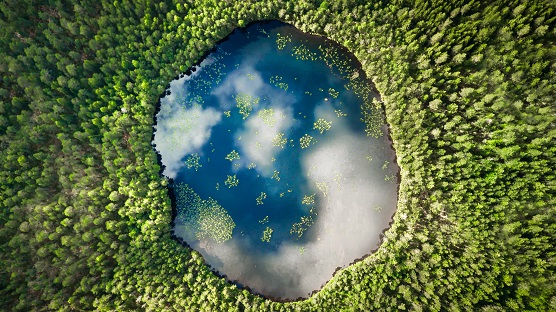
© Adobe Stock
3. Nature conservation can benefit from cost-effective solutions indicated by economic discipline. Restoration repairs and restores degraded ecosystems, but spoiling nature elsewhere can eat away at the achieved cost effectiveness. Retrospective repairs are always more expensive than proactive measures.
Restoration can fight biodiversity loss
Restoring waterways, wetlands, and forests fixes damage that people inflict on natural diversity. Stopping biodiversity loss is essential for securing the well-being of ecosystems and people. Restoration measures secure services provided by the ecosystem, such as clean water, food production, and adapting to climate change. It is essential to target the measures at sufficiently large entireties. Restoration is most effective when extensive national goals are set for it, and when all sectors of society commit to it.
Read more from the press release (sttinfo.fi) (in Finnish)
Learn more about Syke's policy recommendations (issuu.com) (in Finnish)
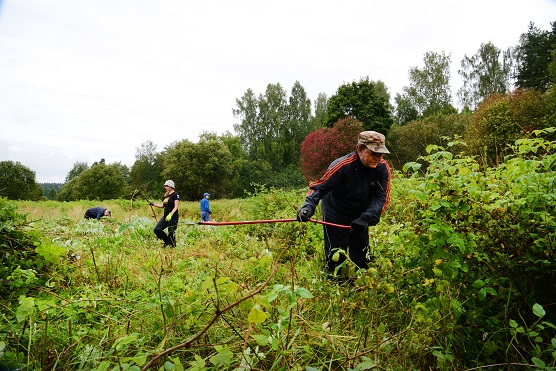
© Riku Lumiaro
4. The use of natural resources should be directed to be sustainable in many ways. The key is to accelerate the circular economy and increase its contribution to the overall economy. In connection with the possible reduction of taxes, consumption must be resolutely directed towards sustainable tracks. Sustainable choices for those with low incomes must also be made possible.
The circular economy plays a key role in curbing climate change and nature loss
Finland should strengthen its leadership in the circular economy by showing that the economy can be strengthened by reducing the use of virgin raw materials and increasing the added value of raw materials. In addition to the added value, sustainability effects must be evaluated in the use of materials and side streams. EU regulation must emphasize the longevity of products. The real costs of using virgin natural resources should be allocated to production and consumption through taxation. This requires reliable natural resource and material information. Calculation of carbon and natural footprints for the entire life cycle of products must be invested.
More information:
Professor Jyri Seppälä IPCC summary report 2023 - YouTube (in Finnish)
Researcher Tiina Karppinen and Senior Research Scientist Kati Pitkänen Circular Economy Indicators conflicting - Kiertotalous-Suomi (kiertotaloussuomi.fi) (in Finnish)
Leading Researcher Jari Lyytimäki and Senior Research Scientist Sampo Pihlainen Kristallipallo-podcast: Green transition (ecowelfare.fi) (in Finnish)
Forest carbon sinks must be protected
Finland will have significant challenges to meet the climate obligations set by the EU for the land use sector for the period 2021–2025. This is especially due to the fact that the carbon sink of forests is becoming clearly too small. In order to remedy the situation, no sufficiently effective control measures have been put in place so far to strengthen the carbon sink of forests. However, new control methods have been presented in the public and literature.
Read more in the bulletin: Forest carbon sink becoming too small without sufficiently effective control measures (sttinfo.fi) (in Finnish)
Growth and sustainability of forest bioeconomy
Syke is part of the Forest Bioeconomy Science Panel, which believes that attention should be paid to the following themes during the next government term: 1. The preconditions for the growth of forest bioeconomy must be strengthened by increasing value added. 2. Action must be taken to strengthen forest growth and health. 3. Actions to strengthen diversity and adapt to climate change must be both effective and cost-effective. 4. Responsible decision-making and proactive forest policy must be based on researched information.
Read more (pdf, metsatiedepaneeli.fi) (in Finnish)
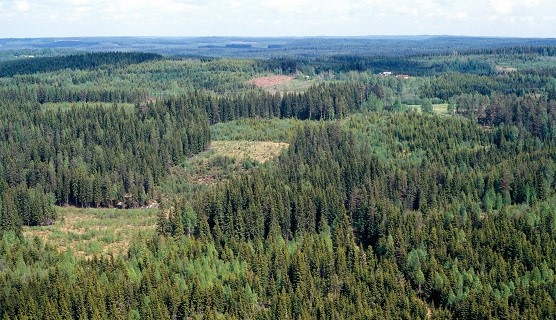
© Unsplash
5. Sustainable energy and food production systems support Finland's self-sufficiency and safety. They can be used to mitigate climate change and biodiversity loss while safeguarding the clean Baltic Sea and water bodies.
Finland needs a joint, forward-looking, sustainable and just food strategy
Our food system suffers from many intertwined sustainability problems. To solve them, a fundamental change of the entire food system is needed, a food transition. A sustainable and functional food system is part of overall safety. The creation of food security is ensured by a well-functioning, fair and sustainable food system that is supported by the social policy of the welfare state.
Read more about the speech of the Just Food project (justfood.fi)
Read the policy recommendations for a just food transition (issuu.com)
Video: Finland needs a sustainable food strategy (youtube.com) (in Finnish)
Utilisation of wastewater nutrients
Utilisation of wastewater nutrients by the Suomen ympäristökeskus - Finnish Environment Institute - Finlands miljöcentral - (issuu.com) (in Finnish)
An agricultural nutrient data repository is needed to support the reduction of the load on the Baltic Sea and water bodies
More effective measures are needed to reduce the nutrient load from agriculture to the Baltic Sea and water bodies. For example, a nutrient data repository, i.e. accounting for the nutrient, cultivation and crop data of the fields, would help in reducing the phosphorus that is washed from the fields and eutrophicates the waters. With its help, water conservation measures could be cost-effectively targeted to where they are most needed.
Read more from the press release (sttinfo.fi) (in Finnish)
Learn more about project's policy recommendations (issuu.com) (in Finnish)
The sustainability of biogas production requires regulatory changes
Biogas production is expected to multiply in the near future. Its growth will be strongly supported by public incentives. In the different stages of the biogas production chain, significant amounts of greenhouse gas and ammonia emissions can be formed, if attention is not paid to minimising them. Therefore, control measures that increase the sustainability of biogas production must be developed. The Government Programme must include a minimum time for the duration of the delay of the biogas process.
Read more (tietokayttoon.fi) (in Finnish)
Read the policy recommendations of the KEBIO project (pdf, tietokayttoon.fi) (in Finnish)
6. Well-being and public health can be increased by supporting Finns in the transition to sustainability. Environmentally friendly mobility, housing and food options should be promoted together.
Guidance for everyday physical activity
Minor everyday physical activity is reflected in reduced public health and in health care costs. Finland would benefit from reducing car use: active modes of transport such as walking and cycling promote health, equality and sustainability at the same time, combining physical activity and transport, without forgetting the economic benefits. Funding for projects focusing on physical activity should be strengthened. Pedestrian and bicycle traffic must be easy and attractive. Experiments and a well-functioning urban structure lay the foundation for the spread of active modes of transport.
Read more (utupub.fi) (in Finnish)
Report: https://helda.helsinki.fi/handle/10138/329273 (in Finnish)
Project: https://ilmastotuuppaus.fi/
Development of energy subsidies
Climate change and the energy crisis have encouraged Finns to reflect on and implement energy renovations. In order to accelerate energy renovations, ARA has distributed energy subsidies since 2020. According to studies, the energy subsidy is a form of support that should be continued, but in order for it to function better, it has to be developed further. Improving the energy efficiency of the building stock reduces energy and housing costs, increases the value of the building stock and improves residential comfort.
Recommendations for developing the subsidies for energy renovations (decarbonhome.fi) (in Finnish)
Read more about the Decarbon-Home project (decarbonhome.fi)
Twitter account of the Decarbon-Home project (twitter.com)
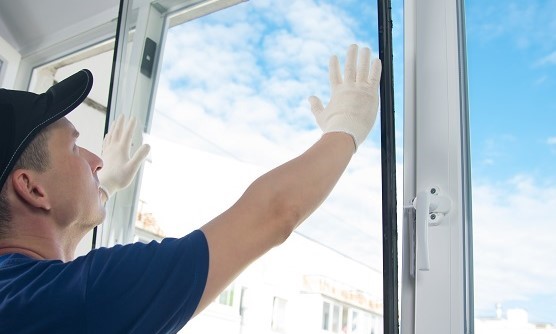
© Adobe Stock
7. Sustainable economic growth requires renewal and innovation. Research and development are needed in society to accelerate overall sustainability. Innovations and the research promoting them support decision-making extensively
A safe and resilient society and sustainable growth are built on RDI activities
Finland needs solution-oriented research more than ever. Global problems and crisis management can only be solved when the entire RDI system (research, development and innovation activities) is strong. This requires the government's support for R&D activities at the level of the entire Government Council. In order for research institutes to be able to respond to demand, their operating conditions must be taken care of. Research institutes offer together in-depth understanding of the environment and the rest of the world for the government to use in solving societal problems.
Read more about the consortium of research institutes in Tulanet's publication (tulanet.fi) (in Finnish)
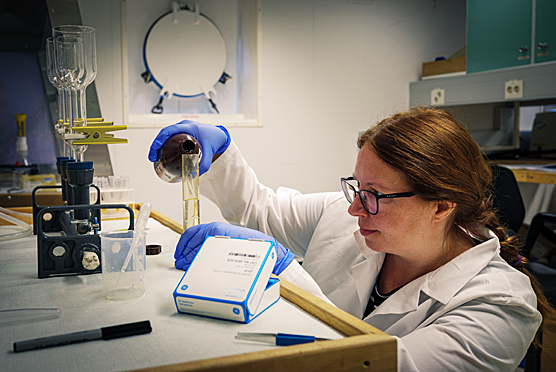
© Ilkka Lastumäki